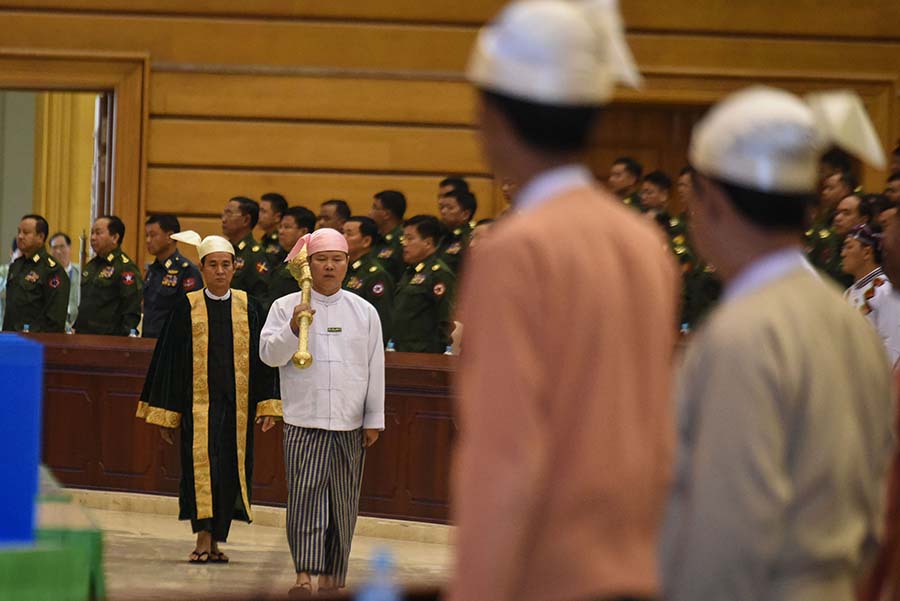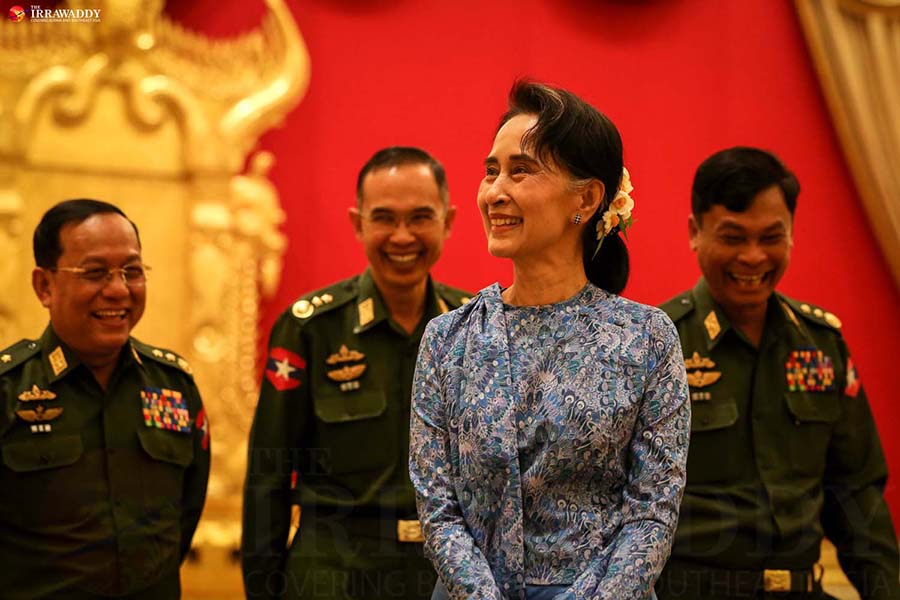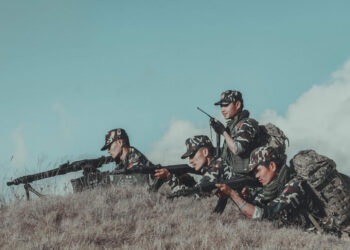YANGON — When the National League for Democracy (NLD)-dominated Parliament convened in early 2016, many expected its main opposition to come from the Union Solidarity and Development Party (USDP), which led the prior government as a proxy of the country’s powerful military. The USDP, which won only 41 of 664 seats in the 2015 general election, has not emerged as such.
Instead, the NLD’s main opposition in Parliament has from the start come from elsewhere: the military appointees.
The military holds 110 seats in the Lower House and 56 seats in the Upper House— reserving fully 25 percent of the seats in all parliaments nationally and regionally— under the military-drafted 2008 Constitution. It also controls three key ministries: Defense, Home Affairs and Border Affairs. The commander-in-chief chooses the military appointees, a vice-president and the three ministers.

Tensions between NLD lawmakers and the military appointees started to arise only days after the NLD government was sworn in on March 30 last year.
In Parliament on April 4, 2016, all military representatives stood up in an apparent sign of protest against the passage of a bill that created a key new post of state counselor for Daw Aung San Suu Kyi, who is barred from becoming president under the Constitution.
Military lawmakers called the bill “unconstitutional.”
Before that, the military appointees had objected to the NLD’s nomination of a vice president and constitutional tribunal members and to an NLD lawmaker’s remarks on the controversial Letpaduang copper mine in Sagaing Division.
“Before, the military and the USDP-led government were on the same side. The military agreed in most cases. But now the military has shown the most opposition to the NLD government and to proposals from NLD lawmakers,” said U Ye Tun, a former lawmaker from Shan State’s Hsipaw Township.
The military’s objections in Parliament have failed to stop the passage of bills and amendments by a legislature dominated by the NLD. But the appointees have used their allotted seats to signal their discontent.
They have expressed their disapproval, for instance, with remarks by the ruling party that they deemed disrespectful of the military, the extension of a government commission’s term, and proposals to amend laws.
Most recently, the entire bloc of unelected military representatives in the Lower House stood up in unison to oppose an NLD motion to place the image of the country’s late independence hero General Aung San — the father of Daw Aung San Suu Kyi — on future bank notes.
Lieutenant Colonel Kyaw Min Hlaing said animals — including peacocks, lions and elephants — were rightly featured on the notes because all of Myanmar’s ethnic groups valued and acknowledged them as national symbols. The military’s objection went viral on social media and met with an angry response from the public. The proposal was passed with a majority of votes from the NLD and ethnic parties.
Crucially, however, while the military appointees cannot amend or make laws on their own, they hold veto power over proposed amendments to the Constitution.
Article 436 of the Constitution says any major changes to the Constitution must have the support of more than 75 percent of both houses of Parliament, making such changes impossible without the appointees’ support. And as the country’s most powerful institution, the military sees its main duty as safeguarding the charter, which guarantees that it maintains an important leadership role.
Here, The Irrawaddy lists some of the military’s most significant confrontations with the NLD in Parliament over the last one year and nine months.
Copper Mine
On Feb. 26, 2016, military appointees in the Lower House stood up to protest remarks by an NLD lawmaker about the controversial Letpadaung copper mine in Sagaing Division, a joint venture between a Chinese firm and a military-run conglomerate.
NLD lawmaker U Kyaw Aung Lwin, representing Magwe Division’s Sidoktaya Township, brought up the copper mine while speaking in support of a proposal tabled by NLD lawmaker Khin San Hlaing calling for scrutiny of an apparent quick-fire sale of state-owned land and projects during the country’s transition period.
Vice President
On March 14, 2016, military representative General Than Soe objected to the NLD candidate for vice president, Henry Van Thio, questioning his eligibility for living abroad.
Constitutional Tribunal
On March 28, 2016, military representative Lieutenant Colonel Tun Lin Oo submitted a proposal opposing the nomination of two of nine Constitutional Tribunal members put forward by President U Htin Kyaw. Lawmakers voted not to discuss the proposal.

State Counselor
On April 5, 2016, military lawmakers refused to cast ballots and stood up to register their protest against a bill creating a key new post of state counselor for Daw Aung San Suu Kyi, who is barred from becoming president under the Constitution even though her party won the supermajority it needed to form a government in the 2015 general election.
Military lawmakers said the bill was “unconstitutional.” Brigadier General Maung Maung labeled the vote “democratic bullying,” referring to the NLD’s dominance in the legislature.
Overnight Guest Registration
On June 3, 2016, military representatives claimed that revoking provisions of Myanmar’s colonial-era Ward or Village Tract Administration Law, which requires citizens to register overnight guests, would jeopardize the country’s national security in both the Lower House and Upper House. NLD lawmakers argued that the amendments to the law were drafted in line with democratic norms.
Democratic Federal Union
On Aug. 30, 2016, when Union Parliament Speaker Mahn Win Khaing Than announced Parliament’s support for the first Union Peace Conference under the NLD government, military lawmaker Major General Than Soe objected to the phrase “democratic federal union” in the statement, claiming the wording violated the Constitution.
Special Cases Assessment Commission
On Feb. 27, 2017, military officials objected to extending the term of the Legal Affairs and Special Cases Assessment Commission, chaired by U Shwe Mann, arguing that it was not formed in line with the 2008 military-drafted Constitution. Ex-General U Shwe Mann, a close ally of Daw Aung San Suu Kyi, was a former Parliament speaker and served as USDP chairman until he was removed from the post during a reshuffle in August 2015.
‘Dictatorship’ Remark
On, Aug. 22, 2017, military representative Major General Than Soe objected to remarks by NLD lawmaker Daw Ei Ei Pyone describing the problems in Rakhine State as a “legacy of dictatorship” and criticizing the military for not doing enough to protect local people despite its huge budget.
“What did she mean ‘bad dictatorial regime?’ Who did she mean? We want to know clearly. We don’t accept the branding of successive governments as bad dictatorial regimes,” he said.
At his request, Daw Ei Ei Pyone’s comments were struck from the record.
Fiscal Year
On Oct. 23, 2017, military representatives joined USDP lawmakers in calling for reconsideration of proposed changes to the fiscal year by the Union Parliament. Military representative Major Thaung Htike Soe argued that the current fiscal year had been used for the past 40 years and that changing it would cause inconvenience.
The Union Parliament endorsed the NLD’s proposal to move the start of the fiscal year to October staring in 2018.
Currency Design
On Nov. 17, 2017, the entire bloc of military appointees in the Lower House and one lawmaker from the USDP stood up in opposition to a motion to reinstate the image of the country’s late independence hero General Aung San on the country’s currency. Military appointee Lieutenant Colonel Kyaw Min Hlaing said the proposal should not be considered while the country’s economy was growing slowly, citing the cost of redesigning and printing new notes.
‘Who is ruling the country?’
On June 11, 2018, six military representatives objected to the NLD government’s decision to include a foreign expert on a commission set up to investigate widespread allegations of human rights abuses in Rakhine State. They argued that such foreign interference posed a threat to the country’s sovereignty.
Military representative Colonel Myint Cho expressed their disapproval by asking, “Who is ruling the country?”
Constitutional Reform
On Jan. 29, 2019, the military representatives in Parliament stood up en masse in a sign of protest against the NLD’s urgent proposal “to form a joint committee to facilitate attempts to amend the Constitution as soon as possible”. The military—which sees safeguarding the Constitution as one of its main duties—also refused to cast ballots when a secret vote was held on whether to debate the proposal.
Brigadier-General Maung Maung said that if Parliament approved discussion of the motion, “It would be pulling the wool over the eyes” of lawmakers. His comment drew a warning from the Parliament Speaker. The military boycott was defeated as a majority of lawmakers voted to approve discussing the proposal.
Following Parliament’s approval, the military lawmakers sent a formal letter of complaint to the Union Parliament Speaker objecting to the proposal.
On Feb. 5, 2019, military-appointed lawmakers refused to participate in a parliamentary debate on the formation of the charter-amendment committee.
Nonetheless, a military lawmaker stood up to object to a remark from Shan Nationalities League for Democracy lawmaker Sai Oo Kham. While speaking in support of forming the committee, Sai Oo Kham said that, “the Constitution privileges the military; thus the military guards the Constitution.” The military lawmaker asked the Speaker to strike the comment from the parliamentary record. The Speaker accepted his request. “It is not directly related to the proposal and could lead to a misjudgment of the [military],” he said.
During the debate, lawmakers from the military-backed Union Solidarity and Development Party (USDP) strongly opposed forming a committee, while lawmakers from the NLD and ethnic parties endorsed it.
On Feb. 6, 2019, the Union Parliament approved the formation of the committee with 414 votes in favor, 191 opposed and six abstentions. It was a secret ballot, but the 31 percent who voted against the motion were likely military representatives appointed by the Army chief, who hold 25 percent of the seats, and members of the USDP, who hold 5 percent.
This story was updated on Feb. 8, 2019 to include the most recent instances of military resistance to the NLD in Parliament.

















